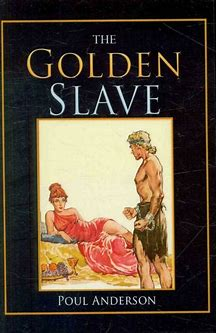(ii) In his science fiction, a time traveler regularly visiting a Dark Age tribe is mistaken for Odin and has to play that role to the end.
(iii) In his heroic fantasy, Odin connives to get the Eddic sword Tyrfing reforged and also prevents a second War between Aesir and Vanir.
Thus, we encounter the original of Odin, a man mistaken for Odin and Odin. The god permeates three genres and four works.
In (i) the historical novel, The Golden Slave (New York, 1980), the central character, leading a slave mutiny, is helped by a large man with red hair and beard who grabs and kills with a hammer, then declares:
" 'They call me Tjorr...' " (p. 128)
I immediately thought, "OK. Where's Odin?" He had been with us from the beginning. The central character, introduced in the second sentence, is called "Eodan." Tjorr goes on to say something equally significant, although I did not realize this on first reading:
" 'I am of the Rukh-Ansa...' " (p. 128)
"Ansa" is another name for "Aesir." As Anderson writes in the Epilogue:
"It was told from olden days, and written in the books of Snorri Sturlason, that the Asa or Ansa folk fared from the land of Tanais to the North. They soon became overlords...who themselves came to be worshiped as gods after they died. The first Asa king was called Odin, and he was the chief of the gods." (pp. 281-282)
And the Author's Note at the beginning of the novel informs us that the "...tradition described in the epilogue may be found..." in the Heimskringla and Saxo Grammaticus. (p. 6)
Thus, Saxo, a source for Anderson's fantasies featuring Odin as a god, is cited here instead as a source for the idea that Odin was a man, later deified. We read in Anderson's Hrolf Kraki's Saga (see here) that there was a temple of the high gods at Upsala but, according to the tradition described in the epilogue, Upsala was first the center from which the human Ansa ruled.
In the novel, we see Eodan lead his men from Tanais. He has encountered Zoroastrianism and we are to understand that the good-evil conflict in that religion informs the gods-giants conflict in Norse religion. Of necessity, Eodan loses an eye during the novel. He says at the end:
" 'I gave it for wisdom.' " (p. 279)

No comments:
Post a Comment